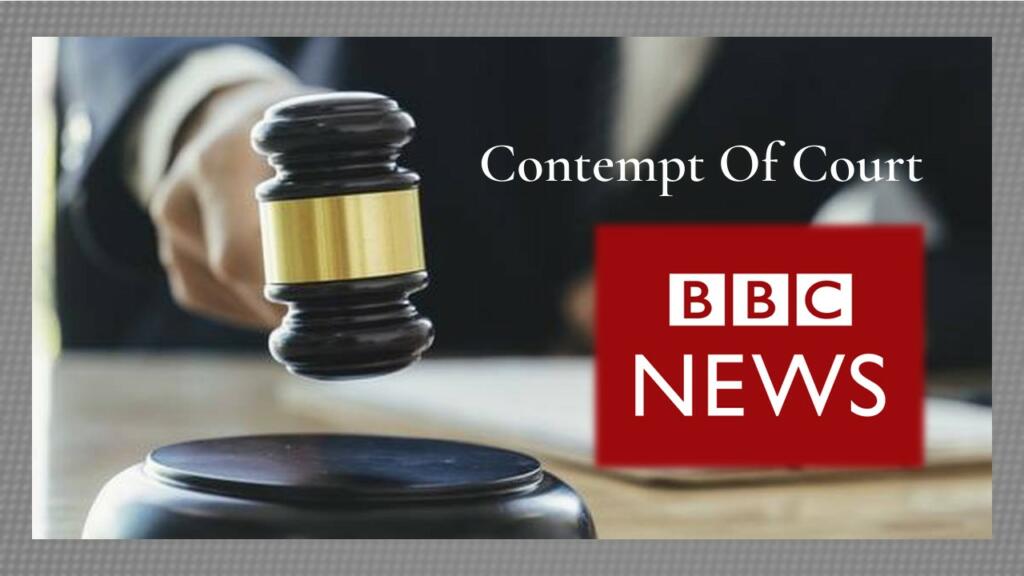BBC documentary on Modi: The British Broadcasting Corporation (BBC) has done it again. Right before the 2024 elections, there is an attempt to malign PM Modi’s image. The larger question is how they can get away with stating exactly the opposite of what the Apex Court has held time and again. Are they above Contempt of Court provisions?
BBC documentary on PM Modi
Recently, the BBC came up with a well-crafted documentary on India. It is named “India: The Modi Question.” Through this documentary, BBC is trying to predict the status of minorities in India in the upcoming future. The 2002 Gujarat riots were used as the starting point for their argument, which many saw as the pinnacle of Hindu anti-Muslim bias.
At that time, PM Modi of India was CM Modi of Gujarat. The BBC documentary, which is only available to foreign audiences, goes into great detail about specific incidents to prove that Mr Modi was guilty of it.
Also read: NJAC and Collegium: The hidden truth
The assertion in the BBC documentary mainly relies on an alleged unpublished investigative report by the British Government on the riots. In the report sent through diplomatic cables, British government’s investigators held Mr Modi directly responsible for killings. According to Britishers, CM Modi provided a climate of impunity to the rioters.
It is also alleged that police personnel in the state police were ordered not to take action against rioters belonging to a particular religion. According to the BBC, the officials in charge of negotiations relied on “reliable sources” to affirm their opinion. Only they can define reliable sources. Maybe they do not want to define it.
Also read: Oleum gas Case: Introduction of absolute liability in India
What did it hide?
There is no shred of actual evidence presented. Even the British government did not find it worthy enough to publish. Recently, current Prime Minister Rishi Sunak slammed the maliciously intended adjectives directed at PM Modi. The BBC documentary deserves the similar criticism that the Indian Supreme Court reserved for Rana Ayyub’s book “Gujarat Files: Anatomy of a Cover-Up.”
The Apex Court had held that the book “is based upon surmises, conjectures, and suppositions and has no evidentiary value.” Having zero evidentiary value makes this BBC documentary eligible for contempt of court. What the documentary asserts about Mr. Modi is exactly opposite of what the Indian legal system has established over the years.
A special investigation team had relieved him of all charges way back in 2012. Most recently, in 2002, the Apex Court of India had given clean chit to PM Modi for riots. Even an appeal against that pronouncement has been dismissed.
Also read: The real story of Lal Bihari immortalised by Pankaj Tripathi on Silver Screen
Zooming in with the legal lens
Despite that, the BBC uses the British government’s alleged inside report to establish the exact opposite. Mind you, this is not disagreeing with the court’s judgments. Neither is it a criticism. If it had been a democratic disagreement or criticism, the BBC would have provided enough evidence to establish the veracity of claims. That kind of leeway is provided for in Section 2(c)(i) of the Contempt of Court Act, 1971. You can criticise the judgement by citing substantial evidence.
What does the BBC have as evidence? A report they claim to have availed from the British Foreign Office. And what is the evidentiary value of it? Probably junk, because even the British government decided not to endorse the findings of the report.
Even if it was endorsed, “reliable sources” in report and publisher’s insistence on not disclosing their name would snatch any reliability. In the name of Gupta Sutra, media publications are infamous for scandalising all sorts of things.
Also read: There are strict guidelines about sale of acid that no one really follows
Scandalising the Court
The problem is that in this case, the BBC documentary is scandalising the Apex Court of India. It is literally the lowering of authority of the Court. The documentary first sets the precedent of its own witnesses and then tends to portray that by not accepting their points, the Indian legal system has done some kind of injustice. Of course, it did not do it explicitly.
But when you analyse words in the context of a sentence, a sentence in the context of segments of a documentary, and segments in the context of the whole documentary, the truth will be crystal clear. People of the ilk of Prashant Bhushan, previous convicts of contempt of court, did not get away with such acts.
Support TFI:
Support us to strengthen the ‘Right’ ideology of cultural nationalism by purchasing the best quality garments from TFI-STORE.COM
